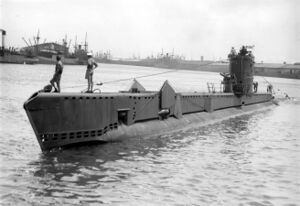Engineering:British V-class submarine
 V-class profile
| |
 HMS Voracious
| |
| Class overview | |
|---|---|
| Name: | V class |
| Builders: | Vickers-Armstrong |
| Operators: |
|
| Preceded by: | U class |
| Succeeded by: | Amphion class |
| Planned: | 42 |
| Completed: | 34 named (8 more never named) of which only 22 were completed. |
| General characteristics | |
| Type: | Submarine |
| Displacement: |
|
| Length: | 204 ft 6 in (62.33 m) |
| Beam: | 16 ft 1 in (4.90 m) |
| Draught: | 15 ft 3 in (4.65 m) |
| Propulsion: | 2 shaft diesel-electric, 2 Paxman diesel generators + electric motors, 615 hp (459 kW) / 825 hp (615 kW) |
| Speed: |
|
| Complement: | 33 |
| Armament: |
|
The British V-class submarine (officially "U-Class Long hull 1941–42 programme") was a class of submarines built for the Royal Navy during the Second World War.[1]
History
Forty-two vessels were ordered to this design, all to be built by Vickers-Armstrong at either Barrow-in-Furness or at Walker-on-Tyne, but only 22 were completed. Note that seven of these vessels received 'U' names (conversely, four of the U class had received names beginning with 'V').
The V-class submarines were very similar to the preceding U-class (short-hull) boats, of which they constituted a linear development, but had 3/4-inch pressure hull plating instead of 1/2-inch for deeper diving, also a lengthened stern and fining at the bows to reduce noise and improve underwater handling.
They were sometimes referred to as Vampire-class submarines after HMS Vampire.[2]
It was one of this class, HMS Venturer (P68), that would go down in history as the only submarine to sink another submarine while submerged - that submarine was the German U-864.
Ships
The vessels which were ordered are shown below in their programme order (not all completed construction):
The first eight vessels were ordered on 5 December 1941 under that year's programme.
- HMS Venturer (P68)
- HMS Viking (P69)
- HMS Veldt (P71), completed as Pipinos (Y8)
- HMS Vampire (P72)
- HMS Vox (P73)
- HMS Vigorous (P74)
- HMS Virtue (P75)
- HMS Visigoth (P76)
The next eighteen vessels were ordered on 21 May 1942 under that year's programme, but six of these were cancelled in early 1944.
- HMS Vivid (P77)
- HMS Voracious (P78)
- HMS Vulpine (P79)
- HMS Varne (P81)
- HMS Upshot (P82)
- HMS Urtica (P83)
- HMS Vineyard (P84), completed as French submarine Doris (P84)
- HMS Variance (P85), completed as HNoMS Utsira
- HMS Vengeful (P86), transferred to Greece in 1945 as Greek submarine Delfin (Y-9)
- HMS Vortex (P87), completed as French submarine Morse (P87)
- cancelled
- HMS Veto (P88), cancelled 23 January 1944 and scrapped on the slip
- HMS Virile (P89), cancelled 23 January 1944 and scrapped on the slip
- HMS Visitant (P91), cancelled 23 January 1944 (never laid down)
- HMS Upas (P92), cancelled February 1944 and scrapped on the slip
- HMS Ulex (P93), cancelled February 1944 (never laid down)
- HMS Utopia (P94), cancelled February 1944 (never laid down)
- HMS Virulent (P95)
- HMS Volatile (P96)
A further six vessels were ordered on 17 November 1942 under the same year's programme, but four of these were cancelled on 23 January 1944.
- HMS Votary (P29)
- HMS Vagabond (P18)
- cancelled
- HMS Vantage, cancelled 23 January 1944 (never laid down)
- HMS Vehement (P25), cancelled 23 January 1944 (never laid down)
- HMS Venom (P27), cancelled 23 January 1944 (never laid down)
- HMS Verve (P28), cancelled 23 January 1944 (never laid down)
Finally, a further ten vessels were ordered under the 1943 Programme, but all of these were cancelled on 20 November 1943; eight of these were never given names.
- cancelled
- HMS Unbridled (P11), cancelled 20 November 1943 (never laid down)
- HMS Upward (P16), cancelled 20 November 1943 (never laid down)
- Eight more unnamed boats
Notes
- ↑ Conway's All the World's Fighting Ships 1922–46
- ↑ Vampire-class Submarines
References
- Allied Warships – Submarine – V Class
- Walters, Derek (2004). The History of the British 'U' Class Submarine. Leo Cooper. ISBN 1-84415-131-X.
 |

